Politics
Greece warns Türkiye over EU funds, ties with Athens
Türkiye is not going to take advantage of European loans or the bloc’s Security Action for Europe (SAFE) program if it “does not show practical examples of improving its relations with Greece,” Greek Prime Minister Kyriakos Mitsotakis said on Sunday.
In an interview with Greece’s OEMA newspaper, Mitsotakis said he repeated that: “if Türkiye does not stop promoting the non-existent theory of gray zones, it will not enter the European Union’s cheap loan program.”
Türkiye, which is a member of NATO but not the EU, is technically eligible to access EU defense industry financing and joint procurement programs as part of the bloc’s 150-billion-euro ($176-billion) Security Action for Europe (SAFE) initiative.
He said that he himself worked to strengthen the Greek Armed Forces, meanwhile. “In a year from now, we will have three ultramodern frigates. We succeeded with Türkiye and overturned the balance in the air, and we have a significant strategic advantage.”
“In terms of bilateral relations, we can do less. In terms of the EU’s relations with Türkiye, we can do much more. And we have already done so,” he added.
Mitsotakis previously mentioned these statements last week on Skai TV. Mitsotakis pointed out that all 27 EU members would have to agree before Türkiye could access SAFE funds.
“Unanimity is required,” he stressed.
His comments came hours after Germany said it had approved the delivery of Eurofighter jets to Türkiye.
Türkiye had been in talks for several years on buying 40 of the aircraft, which are constructed by a consortium from Germany, Britain, Italy and Spain.
After a long period of tensions marked by disputes over irregular migration, the Cyprus dispute, energy exploration and territorial sovereignty in the Aegean, Türkiye and Greece have been taking confidence-building steps for a fragile normalization of their relations, which moved into a new chapter with Erdoğan’s landmark visit to Athens in 2023. During the visit, the sides announced a friendship declaration, visa facilitation for Turkish citizens to visit 10 Greek islands in the northern Aegean, and a decrease in the flow of irregular migrants to Greece.
Tensions rose again recently with Athens’ new move raising further disputes.
Earlier this year, Greece released a marine spatial planning map, which Türkiye said violates its maritime jurisdiction in the Aegean Sea and the Eastern Mediterranean.
Politics
AK Party academy revolutionizes Turkish political training
Launched in 2008 under the leadership of President Recep Tayyip Erdoğan, the Justice and Development Party’s (AK Party) Political Academy has become one of the most influential political education programs in Turkish history.
Conceived by former Yozgat deputy and academic Osman Coşkun, the project began in 20 cities. It quickly spread to all 81 provinces, training tens of thousands in the principles and practice of politics.
Coşkun, also Türkiye’s chief auditor for personal development and total quality management, recalls identifying a gap in structured political training within party ranks.
“I proposed an academy run by experts, financed sustainably and open to everyone from mayoral candidates to grassroots members,” he said.
Erdoğan embraced the idea, assigning Coşkun to oversee its implementation.
The response was immediate. Following Erdoğan’s announcement at a party group meeting, applications poured in nationwide.
From the first sessions in January 2008, the academy stood out for blending theory with practical skills, covering areas such as constitutional law, democracy, leadership, elections, governance, communication, protocol and public speaking.
Certification, performance evaluation and awards strengthened its professional framework.
Erdoğan often delivered the opening lectures himself, highlighting the program’s importance for Türkiye’s political future.
Sustained for more than 15 years, the academy ranks among the few global examples, outside China’s Communist Party, of long-term, large-scale political training, according to Coşkun.
“I am proud to have helped create a platform that enhances political quality, broadens participation, and produces well-prepared cadres,” Coşkun said.
Nationwide outreach
With one of the largest political followings, the AK Party continues to strive for enhanced outreach, particularly in explaining its new “terror-free Türkiye” initiative.
Following its workshop last month on a strategic roadmap for 2026, the party has dedicated August entirely to fieldwork, listening to citizens’ concerns and sharing its roadmap.
Senior party figures, including deputy chairpersons and MPs, will meet with communities nationwide as the party prepares to celebrate its anniversary on Aug. 14. Although parliament is in recess until Oct. 1, the terror-free Türkiye committee will begin its work on Aug. 5.
Under the “Century of Türkiye City Meetings” program, the AK Party will visit trade chambers, bar associations, nongovernmental organizations (NGOs), and small businesses, gathering feedback to inform the shaping of future policies.
Reports from these meetings will be sent to party headquarters for evaluation, ensuring that citizens’ voices remain central to the AK Party’s political vision.
Politics
Türkiye, Syria discuss strengthening security cooperation
Vice President Cevdet Yılmaz met with Syrian Interior Minister Enes Hattab at the Presidential Complex in Ankara to discuss strengthening security cooperation between the two countries. Turkish Interior Minister Ali Yerlikaya also attended the meeting.
Following the talks, Yılmaz underscored the importance of stability in Syria for the region’s peace and prosperity.
“Strengthening security in Syria is vital for the consolidation of internal peace, economic development and social welfare,” he said on social media platform X.
Yılmaz reaffirmed Türkiye’s commitment to supporting Syria’s stability, institutional development and governance that embraces all sectors of society.
“As the Republic of Türkiye, we will continue to support Syria’s stability, the development of its institutional capacity and governance that encompasses all segments of society,” he said.
Expressing Ankara’s vision for Syria’s future, Yılmaz voiced hope for a political environment in which “our Syrian brothers and sisters can equally enjoy fundamental rights and freedoms under an inclusive and legitimate government.”
The vice president also reiterated Türkiye’s longstanding position on the need to safeguard Syria’s sovereignty and territorial integrity. “We will continue to strongly support Syria’s stability, territorial integrity, and sovereignty,” he emphasized.
The meeting comes as Türkiye and Syria consider deeper cooperation in the post-Assad era amid growing concerns over the U.S.-backed terrorist group YPG.
Ankara has pledged to continue supporting Syria’s political unity and territorial integrity, providing training and technical support upon request from Damascus to strengthen its fight against terrorist groups.
Ankara is closely monitoring the integration of the PKK terrorist group’s Syrian wing, the YPG, into the Syrian army, a process expected to conclude by the end of the year. Turkish officials have said this development will be decisive for Syria’s long-term security architecture.
The new Syrian government, established after the ouster of former regime leader Bashar Assad on Dec. 8, 2024, has been working to restore order nationwide. Ankara, which has developed cordial ties with the new leadership, has repeatedly offered operational and military assistance to Damascus to combat Daesh and other terrorist threats.
President Recep Tayyip Erdoğan has vowed that Türkiye “will not allow terrorists to drag Syria back into chaos and instability.”
Türkiye, Syria, Jordan and Iraq have activated the Counter-Daesh Coordination Cell, as announced by Foreign Minister Hakan Fidan last month. The joint mechanism aims to eliminate remaining Daesh threats, making it unnecessary for the West to rely on YPG militants in the fight against terrorism.
With security and counterterrorism at the forefront, Ankara views its cooperation with Damascus as central to ensuring a stable, sovereign and territorially unified Syria.
Politics
Erdoğan to visit Ukraine, free trade on agenda: Envoy
Ukraine’s Türkiye Ambassador Nariman Dzhelyal said Kyiv will soon host President Recep Tayyip Erdoğan. Quoted by the RBC-Ukraine website on Monday, Dzhelyal stated that they were working to schedule the visit following a personal invitation to Erdoğan by President Volodymyr Zelenskyy.
The envoy said ratification of a free trade agreement between the two countries will likely be discussed during the Turkish leader’s visit. “This visit requires significant effort, as many issues are hindering its realization,” Dzhelyal said.
Erdoğan paid a visit to Ukraine in August 2022, his first since the start of the Russia-Ukraine conflict, and held a trilateral meeting with Zelenskyy and U.N. Secretary-General Antonio Guterres. In that visit, Erdoğan pledged assistance to Ukraine for rebuilding and recovery. Zelenskyy, on the other hand, is a frequent visitor to Türkiye and last met Erdoğan in Ankara in May.
Last month, Erdoğan told reporters that Türkiye wanted to bring together leaders of Ukraine, Russia and the United States to achieve peace in the ongoing war.
Additionally, last month, Türkiye hosted a meeting between Russian and Ukrainian delegations in Istanbul. The rival sides met earlier in Istanbul on May 16 and June 2 amid U.S. pressure to agree on a cease-fire to end the three-year-old conflict. Despite the urging of U.S. President Donald Trump, no breakthrough was made.
Ukrainian and Russian negotiators have so far only agreed to hold prisoner exchanges. And Russia has since launched intense air attacks on Ukraine and seized more front line territory.
Russia has demanded that Ukraine give up four regions, on top of Crimea, which it annexed in 2014. The Kremlin also insists that Ukraine should abandon any plans to join the NATO military alliance.
Ukraine has rejected the demands and expressed doubt that Russia wants a cease-fire.
Ankara is keen on boosting its international profile as a key mediator and utilizes Istanbul’s symbolic location to promote diplomacy between the parties involved in conflicts and disagreements on a global level.
NATO member Türkiye is one of the most active countries working to ensure a permanent cease-fire between Ukraine and Russia. Its delicately balanced act of assuming a role as a mediator by keeping communication channels with both warring sides open provides a glimmer of hope in diplomatic efforts to find a solution and achieve peace in the Ukraine crisis. With its unique position of maintaining friendly relations with both Russia and Ukraine, Türkiye has garnered widespread praise for its efforts to end the war.
While Ankara has opposed international sanctions aimed at isolating Moscow, it has also closed its straits to prevent some Russian vessels from crossing through them.
Dzhelyal said on Monday that ratification of a free trade agreement is important for Ukrainian businesses and strategic partnerships.
Zelenskyy said on Sunday that Kyiv is working on a list of prisoners to be exchanged with Russia, which the two sides agreed upon during their latest talks in Türkiye last month.
This came following his meeting with National Security and Defense Council Secretary Rustem Umerov and the head of the Presidential Office, Andriy Yermak, on the implementation of agreements reached in Istanbul.
After the third round of talks, Ukraine proposed a meeting of the heads of state before the end of August, and the two sides reached a consensus on continuing to exchange prisoners of war.
Vladimir Medinsky, who led Russia’s delegation at the talks, said at a press conference following the talks that both sides had completed an earlier exchange involving 1,200 prisoners of war from each side, but confirmed that they also agreed on a new prisoner swap in the same format.
“Among the key issues is the continuation of POW (prisoners of war) exchanges. There is an agreement to exchange 1,200 people and work on the lists is ongoing,” Zelenskyy said in a statement on X, noting that Umerov, who led Ukraine’s delegation at the Istanbul talks, reported to him on communications with the Russian representative.
“We are also working to unblock the return of our civilians and are verifying data on each individual,” Zelenskyy further said.
He also said that Yermak reported to him on Ukraine’s coordination with its partners in supporting Kyiv’s diplomatic efforts, particularly with the U.S., among other issues.
Politics
Erdoğan urges UK PM Starmer to press Israel for Gaza cease-fire
President Recep Tayyip Erdoğan told U.K. Prime Minister Keir Starmer on Monday that the humanitarian situation in Gaza has reached a critical point, urging concrete steps to pressure Israel into a cease-fire and a two-state solution, as he welcomed the latter’s recent remarks on Palestine, the Presidential Communications Directorate said.
In a phone call, Erdoğan said it is a duty to humanity to move beyond merely voicing concern over the crisis.
He noted that Türkiye continues to send humanitarian aid to Gaza and supports mediators’ efforts to secure a cease-fire and advance negotiations.
The president also congratulated Starmer for his recent remarks on recognizing the State of Palestine.
Last week, Starmer said that the U.K. would recognize a Palestinian state in September unless Israel agrees to a Gaza cease-fire, permits U.N. aid deliveries, and takes further steps toward lasting peace.
Pressure to formally recognize Palestinian statehood has mounted since French President Emmanuel Macron announced that his country will become the first major Western power to recognize a Palestinian state in September.
More than 250 of the 650 lawmakers in the House of Commons have signed a letter urging the government to recognize a Palestinian state.
More than 140 countries recognize a Palestinian state, including a dozen in Europe. Macron’s announcement last week make France is the first Group of Seven country and the largest European nation to take that step.
Gaza’s 2.3 million residents face an unfolding humanitarian nightmare marked by widespread hunger, shortages of water, medicine and hygiene supplies due to Israel’s ongoing blockade and atrocities.
Since Oct. 7, 2023, starvation has claimed more than 145 lives, including 88 children, in Gaza, where local and international observers accuse Israel of weaponizing hunger and thirst.
Israeli forces have destroyed 88% of Gaza’s civilian infrastructure and regularly bomb displaced Palestinians forced from their homes by repeated orders of expulsion.
More than two million Palestinians have been displaced multiple times, living in makeshift tents or overcrowded shelters lacking proper sanitation, where infectious diseases spread.
Daily Israeli airstrikes continue to target these vulnerable populations’ shelters and civilian centers.
Israel’s assaults have killed more than 60,000 Palestinians and injured over 146,260, according to local health authorities.
Politics
Erdoğan touts ‘historic’ steps to protect Türkiye’s future
Türkiye is taking historic steps to protect its future, President Recep Tayyip Erdoğan said Tuesday ahead of an annual meeting of the Supreme Military Council in Ankara.
“Our struggle to make Türkiye the leading nation in its region within the reshaped global order continues, despite the traps set against us and the attacks from both within and beyond our borders,” said Erdoğan, reading aloud a message he wrote at the mausoleum of Mustafa Kemal Atatürk, the founder of modern Türkiye, in a ceremonial visit before the meeting.
“We are taking historic steps to safeguard our nation’s future, from security to democracy, from the economy to technology, from the defense industry to foreign policy,” he added.
“We believe that the 2025 meeting of our council will be a new milestone on the path toward the vision of the Century of Türkiye,” added the president, who paid the visit along with members of the council.
Erdoğan also paid tribute to Atatürk and all the lives sacrificed “for our future.”
Promotions
The annual gathering of senior political and military leaders decided key promotions, retirements and extensions of service that shaped the Turkish Armed Forces’ (TSK) command structure.
Chief of General Staff Gen. Metin Gürak, appointed in 2023, was retired and was replaced by Commander of the Land Forces Selçuk Bayraktaroğlu to serve a four-year term, the Presidential Directorate of Communications said following the meeting, which lasted two and a half hours.
Gen. Metin Tokel, commander of the 1st Army, was appointed commander of the Land Forces, while the terms Naval Forces Cmdr. Adm. Ercüment Tatlioğlu and Air Forces Cmdr. Gen. Ziya Cemal Kadıoğlu were extended by one year.
The number of generals and admirals, currently 316, will increase to 332 as of Aug. 30, 2025, according to the directorate.
The council promoted 32 generals and admirals to the next rank and promoted 61 colonels to the rank of general or admiral. The terms of 29 generals were extended by a year, and the terms of 478 colonels were extended by two years.
The council retired two generals effective Sept. 1, 2025, due to age restrictions, and 43 generals and admirals were retired effective Aug. 30 due to a lack of permanent positions.
Other notable changes in the military ranks include the promotion of Lt. Gen. Bahtiyar Ersay and Rafet Dalkıran to full general in the Land Forces Command, as well as the elevation of seven major generals from the Land Forces to lieutenant general.
Rear Adm. Rafet Oktar was promoted to vice admiral and Air Force Maj. Gen. Ergin Dinç advanced to the rank of lieutenant general. Fifteen Air Force brigadier generals were promoted to major general, along with three from the Air Force and three rear admirals in the Naval Forces receiving higher ranks.
At last year’s assembly, 31 generals and admirals retired, while 23 were promoted to the next rank. Some 77 colonels were promoted to general and admiral ranks.
The terms of 34 generals and admirals were extended by one year, and the terms of 455 colonels were extended by two years, raising the number of active generals and admirals from 281 to 327.
Council tradition
The tradition of high-level military councils in Türkiye dates back to the Ottoman era, with the establishment of the first Supreme Military Council in 1837 under Sultan Mahmud II. Initially tasked with drafting military regulations, resolving service-related issues and adapting Western military practices, the council underwent several reorganizations and periods of abolition in the late Ottoman period.
Following the founding of the Republic of Türkiye in 1923, the modern Supreme Military Council was formally established in 1925. Its early role was to operate in peacetime, advising on military affairs and promotions, with the president serving as its ex officio chair.
Over the decades, its structure and leadership evolved, reflecting shifts in Türkiye’s political system and civil-military relations.
During the multiparty era that followed 1946, the prime minister assumed the chairmanship, and membership was adjusted to include senior commanders and select ministers. The council’s mandate became more formalized in 1972 with the enactment of Law No. 1612, which focused on promotions, retirements, and strategic planning.
The council’s authority and composition shifted significantly after major political events, including the 1980 military coup and, most recently, the Gülenist Terrorist Group’s (FETÖ) failed coup attempt of July 15, 2016.
Post-2016 reforms expanded civilian oversight and aligned the council’s procedures with Türkiye’s transition to a presidential system in 2018, making the president its chair and broadening ministerial participation.
Today, the Supreme Military Council meets annually to decide on promotions, retirements and extensions of service for senior officers. While its core mission remains military personnel management, the council also serves as a symbolic and strategic forum reflecting the balance between civilian authority and the army leadership in modern Türkiye.
Politics
Committee scheduled to chart road map for terror-free Türkiye
A seminal committee will gather for the terror-free Türkiye initiative on Tuesday. Comprising several political parties represented in Parliament, the committee will weigh the future of the initiative involving the disarmament of the terrorist group PKK.
Parliament Speaker Numan Kurtulmuş will chair the first meeting of the committee, which will initially debate its principles and working methods. After an opening speech by Kurtulmuş, lawmakers will voice their opinions on the committee and the initiative.
The committee’s members include parliamentarians from ruling Justice and Development Party (AK Party), its ally Nationalist Movement Party (MHP), main opposition Republican People’s Party (CHP), Peoples’ Equality and Democracy Party (DEM Party), New Path bloc, Türkiye Labor Party (TIP), Labor Party (EMEP), New Welfare Party (YRP), Democratic Left Party (DSP), Free Cause Party (HÜDA-PAR) and Democrat Party (DP).
The MHP’s leader, Devlet Bahçeli, is the informal architect of the initiative that began with his call to the PKK’s jailed ringleader, Abdullah Öcalan, last year to urge his group to lay down arms.
The initiative surprised many at first as it was commenced by an unexpected name who is known for his staunch support for strict counterterrorism efforts to wipe out the PKK. Bahçeli has reasoned that the PKK’s dissolution is a must to reinforce unity in Türkiye at a time of Israeli expansionism that also threatens Türkiye. The PKK’s longtime goal has been carving out a so-called Kurdistan in the southeast and it exploited the Kurdish community of the country, who were deprived of some fundamental rights in the past. Bahçeli and AK Party Chair President Recep Tayyip Erdoğan repeatedly emphasized Turkish-Kurdish unity as key to the future of the country against any separatist agendas.
A recent survey conducted by polling company ASAL earlier this month shows that more than 61% support the initiative. The initiative is not without its opponents and skeptics. The CHP endorses the initiative but expresses reservations about its success. The far-right Good Party (IP) flatly opposed it and plans to hold nationwide “First Duty” rallies to voice its opposition. Inspired by the first sentence of a famous address to Turkish youth by the republic’s founder, Mustafa Kemal Atatürk, the rallies aim to sway public opinion against the initiative.
The DEM Party is a key actor in the initiative due to its links to the PKK, and its lawmakers served as messengers between Öcalan and political parties during the initiative’s first stages. The DEM Party’s deputy parliamentary group chair Gülistan Kılıç Koçyiğit, who is part of the committee, said on Monday that all parties should participate in the committee. Koçyiğit stated at a news conference at Parliament that the committee’s name was now up for debate, but they would likely favor a name reportedly proposed by Kurtulmuş: “the Committee for Social Solidarity, Fraternity and Democracy.” Koçyiğit said the process at the committee should be “transparent,” although she acknowledged that some parts of the sessions may need to be closed to the media due to the sensitive nature of the initiative. “It is crucial to explain it to the public,” she underlined.
In May, the PKK, blacklisted as a terrorist group by Türkiye, the U.S., the U.K. and the EU, announced its dissolution and the end of its four-decade terror campaign that cost tens of thousands of lives in Türkiye, as well as in Iraq and Syria.
Most recently, in a ceremony across the border in Iraq last month, PKK members destroyed their weapons as part of the process. Turkish intelligence monitors the process.
The committee’s work will concentrate on the state of PKK terrorists who abandoned arms and those who were incarcerated for aiding and abetting the PKK. The PKK is still regarded as a terrorist group and the committee will likely debate about its future status once the group entirely abandons arms.
Media reports indicate that the committee will chart a roadmap for the initiative and discuss regulations and amendments to accelerate it, including those similar to the “Homecoming Law” implemented in 2003, which offered lenient sentences for PKK members not involved in terror attacks. The committee’s work will serve as a guideline for future bills on terrorism.
-
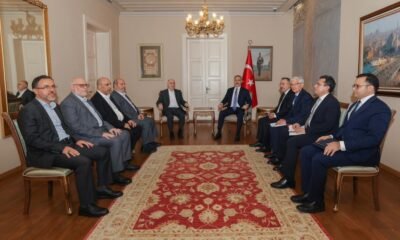
 Politics2 days ago
Politics2 days ago‘Israel intentionally stalling cease-fire talks to weaken resistance’
-
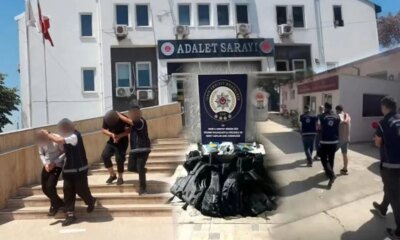
 Daily Agenda2 days ago
Daily Agenda2 days ago102 immigrant smugglers and 393 irregular immigrants were caught
-
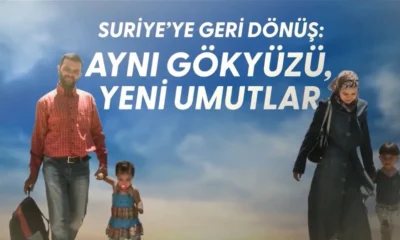
 Daily Agenda2 days ago
Daily Agenda2 days agoTürkiye, next to the Syrian brothers! Historical Number on Volunteer Return: More than 1 million Syrian returned
-

 Economy2 days ago
Economy2 days agoAustralian state aims to write into law rights on work from home
-

 Sports2 days ago
Sports2 days agoLuka Doncic signs $165M deal to extend Lakers stay by 3 years
-
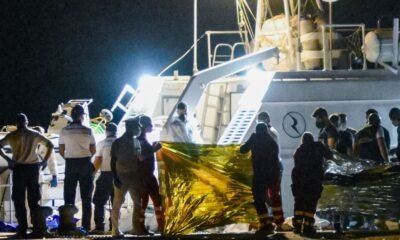
 Politics2 days ago
Politics2 days agoItaly praises Türkiye’s cooperation in migration management
-
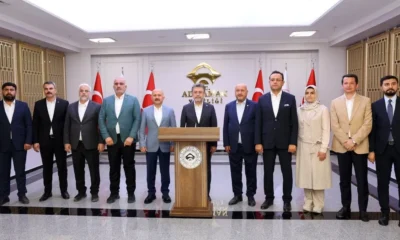
 Daily Agenda3 days ago
Daily Agenda3 days agoMinister Yumaklı met with sector representatives in Adıyaman! Turkey’s century emphasis on Turkey
-
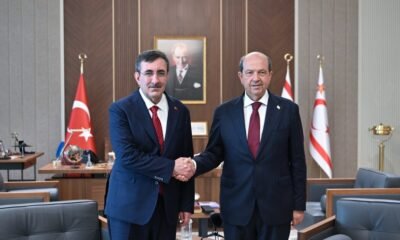
 Politics2 days ago
Politics2 days agoTürkiye, TRNC deepen cooperation in security, digital governance




